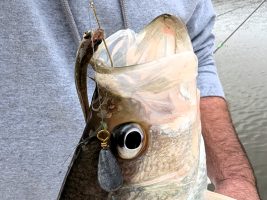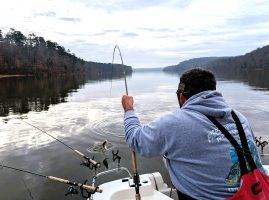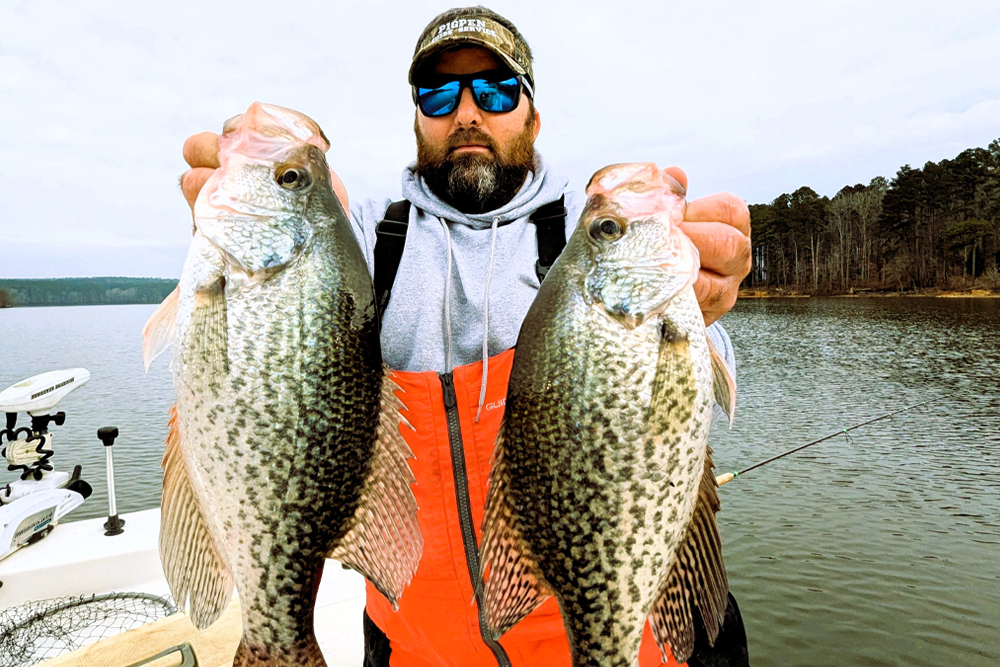A confirmed minnow-man, Capt. Travis Bradshaw relies on live
minnows to put slab crappie in his boat during cold weather.
A Crappie Guide’s Tactics for Winter Live Bait Fishing
Photos and Story by Terry Madewell
One of the appealing attributes of crappie fishing is that anglers have a variety of options that enable them to be productive, especially during the cold-weather months. Crappie may be deep, shallow, or suspended somewhere in between these depth extremes, and that’s generally based on water and weather conditions.
This wide array of options extends to the lures and specific tactics to employ. Jigheads are available in a wide variety of shapes and sizes, to complement the many options of plastic profiles designed to mimic forage.

Some Anglers Prefer to Keep It “Old School”
But some anglers take a different approach and are more ‘old school’ in their delivery of options for making a crappie bite. Many highly productive, professional crappie fishing guides still prefer traditional electronics over forward-facing sonar (FFS). And some like the old school – but still cool – tactic of using live minnows to produce limit catches during the winter.
Guiding on Two of North Carolina’s Top Crappie Lakes
Capt. Travis Bradshaw with Pigpen Guide Service, is a highly productive old-school angler, and he guides on two premier crappie-producing lakes in the Triangle area of North Carolina, Jordan and Shearon Harris lakes. These lakes are known for their abundant crappie populations, making them ideal for live bait fishing.
Bradshaw said that for his preferred guiding style, minnows are ideal.
“Both lakes are prime crappie hotspots, and the patterns set up perfectly for live bait fishing, and I actually use minnows year-round on these lakes,” he said.
Why Live Bait Works Best for Most Clients
Bradshaw doesn’t have a personal hangup with artificial lures; he’s successfully fished a wide variety of jigs and plastics. But in his crappie guiding business, he’s found that most anglers simply want to catch fish and enjoy the day. They don’t want to become crappie fishing pros.
“Most of my clients are not experienced fishermen, and fishing with artificial lures can require specific tactics, including depth and speed control, and an acquired ‘feel’ for detecting subtle bites during cold weather,” he said.
“Even anglers with considerable fishing experience have difficulty feeling the subtle bite of a crappie on a jig in cold, deep water,” he said. “I frequently watch anglers using forward facing sonar close to my boat, and I know they’re skilled crappie fishermen, but we’re catching crappie at a much higher rate using live minnows.”

Family-Friendly Fishing Success
Bradshaw’s daily goal is for his clients to catch crappie, and his experience has proven that nothing beats live minnows for consistently achieving that goal. His consideration of the diversity of fishermen’s skill levels aboard his boat is one reason he employs live bait.
Bradshaw’s clients run the gamut of personalities, including many family groups looking for the chance to catch fish together, and the ages range from eager youngsters to grandparents.
“Minnows have a natural, built-in scent, action, and wiggle, because they are the real thing,” he said. “They are what artificial lures are designed to mimic. As a crappie-catching tool, live minnows are ideal for my purposes.”
Controlling the Factors for a Better Bite
“Using live minnows enables me to control a lot of the factors that make a crappie bite,” he said. “I can control where we fish, and that will be where I mark crappie on my electronics. I’ll fish minnows at the depth, or slightly above, where they’re marked.
“Catching crappie on Jordan and Shearon Harris lakes, or any lake, requires fishermen to first find where crappies are congregated,” he said. “During the winter, they can be grouped tightly in small areas, or in larger general areas, perhaps suspended. Minnows fished on simple, but effective, rigs provide the flexibility to transition to new targets quickly and easily.”
The Setup: Rigs, Rods, and Tactics
Bradshaw rigs an assortment of 10-foot, 11-foot, and 12-foot light-tip rods with spinning reels. He loads 10-pound-test line on the reel, and the terminal end is anchored with a 3/8-ounce weight. About 8 to 12 inches above that, he ties a number 2 Aberdeen wire hook to a leader, hooking the minnow through the lips. He also uses a double hook rig, with a second leader a foot above the lower one.
“I adapt to what the fish give me, and some days the two-hook rigs produce best, other days crappie bite better on single-hook rigs,” he said. “I’ll try to determine the best bite on that day. Crappie are depth-specific, so fishing at two depths can help at times.

“I’ll move the boat along at about 0.4-to-0.5 miles per hour with eight rigs out of the back of the boat and four in the front,” Bradshaw said. “This provides wide coverage, and I stagger depths I’m fishing on the rigs until I determine a daily depth pattern. But that depth preference may change even during a single trip.”
Adjusting for Depth and Minnow Size
“The size of the minnows can play a role in success, so I intentionally get minnows with mixed sizes, and I vary the sizes fished until I find a daily preference,” he said.
“Typically, small minnows work best in cold weather, and sometimes minnow size doesn’t matter, but I always test it.”
But what does matter is the depth he catches fish on a given day, and that’s not only a daily process but an ever-changing factor throughout any day.
“I fish where the fish are marked, and not all the crappie will always be at the same depth, so I may stagger rigs at different depths,” Bradshaw said. “At both lakes Jordan and Shearon Harris, I may find a depth range of 8 feet or more where crappies are suspended in deep water during cold weather.”
Minnows: The Ultimate Crappie Imitation
Regardless of the pattern changes, Bradshaw remains confident in his bait choice.
“I know minnows provide my anglers the best opportunity to hook and land lots of crappie, including slabs, and that’s my personal goal,” he said. “My perspective is that artificial lures are trying to imitate forage, and minnows are living forage.”
Terry Madewell of Ridgeway, S.C., has been an outdoor communicator for nearly 50 years. He holds a degree in Wildlife and Fisheries Management and has a long career as a professional wildlife biologist/natural resources manager. He’s passionate about sharing outdoor adventures with others.


